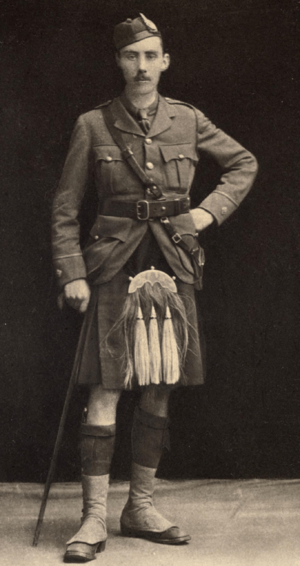Ewart Alan Mackintosh facts for kids
Ewart Alan Mackintosh (born March 4, 1893 – died November 21, 1917) was a brave soldier and a talented war poet. He served as an officer in the Seaforth Highlanders, a famous Scottish army regiment, starting in December 1914. Mackintosh sadly died during the Battle of Cambrai in 1917. Many people say his poems were as good as those by other famous war poets like Rupert Brooke.
Contents
Early Life and Education
Ewart Alan Mackintosh was born in Brighton, England, on March 4, 1893. He was the only son of Alexander and Lilian Mackintosh. Even though he was born in England, his family had strong roots in Clan Mackintosh from Alness, Scotland. His grandfather, James Guinness Rogers, was a well-known preacher. Ewart was named after William Ewart Gladstone, a British Prime Minister, because his grandfather was friends with him.
Ewart went to school at Brighton College. During his holidays, he learned Scottish Gaelic, which is a language spoken in Scotland. He also learned to play the Highland war pipes, a traditional Scottish instrument. Later, he studied at St Paul's School in London and then went to Christ Church, Oxford University to study Classics.
Joining the Army
When World War I started in August 1914, Ewart was still at university. He was part of the University of Oxford Officers' Training Corps, which trained students for military roles. He tried to join the army right away but was turned down because of his poor eyesight. However, he tried again and was accepted by the Seaforth Highlanders. He became a second lieutenant (a junior officer) on December 31, 1914. He served with the 5th Battalion of the Seaforth Highlanders, which was part of the 51st (Highland) Division.
Military Service and Bravery
In August 1915, Mackintosh was wounded during fighting in High Wood on the Somme battlefield in France. He then returned to Britain. For eight months, he was stationed near Cambridge, where he helped train new soldiers, called cadets. During this time, he got engaged to Sylvia Marsh, who came from a Quaker family. Quakers are a religious group known for their peaceful beliefs.
On May 16, 1916, Mackintosh led a dangerous "trench raid" near Arras. A trench raid was a surprise attack on enemy trenches. During this raid, fourteen of his men were wounded, and two were killed. One of the soldiers who died was David Sutherland. His death inspired Mackintosh to write a famous poem called "In Memoriam".
Mackintosh was promoted to a temporary first lieutenant and received the Military Cross on June 24, 1916. This medal is given for acts of bravery during battle. His award was officially announced in the London Gazette, a special newspaper for government news. The announcement said he showed "great skill and courage" during the raid. He even brought back two wounded men while under heavy enemy fire.
Mackintosh tried to save David Sutherland, who was badly injured, but Sutherland died and had to be left behind. He has no known burial place but is remembered on the Arras Memorial in France. Mackintosh, who was 23 years old, felt like a father figure to his soldiers. They affectionately called him "Tosh." Many of his soldiers were from Scotland, but some were also from New Zealand. One of Mackintosh's last poems, Cha Till Maccrimmein, seemed to predict his own death.
Death in Battle
Ewart Alan Mackintosh was killed in action on November 21, 1917. This was the second day of the Battle of Cambrai. He was with the 4th Seaforth Highlanders, observing intense fighting near the village of Cantaing in France. The Battle of Cambrai was important because it was one of the first times that many tanks were used together in a large attack. Mackintosh was buried in the Orival Wood Cemetery near Flesquières in northern France.
Legacy and Remembrance
Mackintosh's poetry is highly regarded, and some say it was as good as the work of more famous war poets like Rupert Brooke. Lines from his poem "A Creed" are carved on "The Call 1914," which is part of the Scottish American Memorial in Edinburgh's Princes Street Gardens. This memorial was built in 1927 and paid for by Scottish Americans. It honors the bravery of Scottish soldiers in World War I.
On the 90th anniversary of Mackintosh's death, a small ceremony was held in France to remember him. There were also plans to dedicate a chapel to him and his regiment.
Published Works
- A Highland Regiment and Other Poems, 1917
- War, The Liberator, and Other Pieces, London, John Lane; New York, John Lane company, 1918.
About Mackintosh
- Can't Shoot a Man with a Cold: Lt. E. Alan Mackintosh MC 1893 – 1917 Poet of the Highland Division, by Colin Campbell and Rosalind Green


